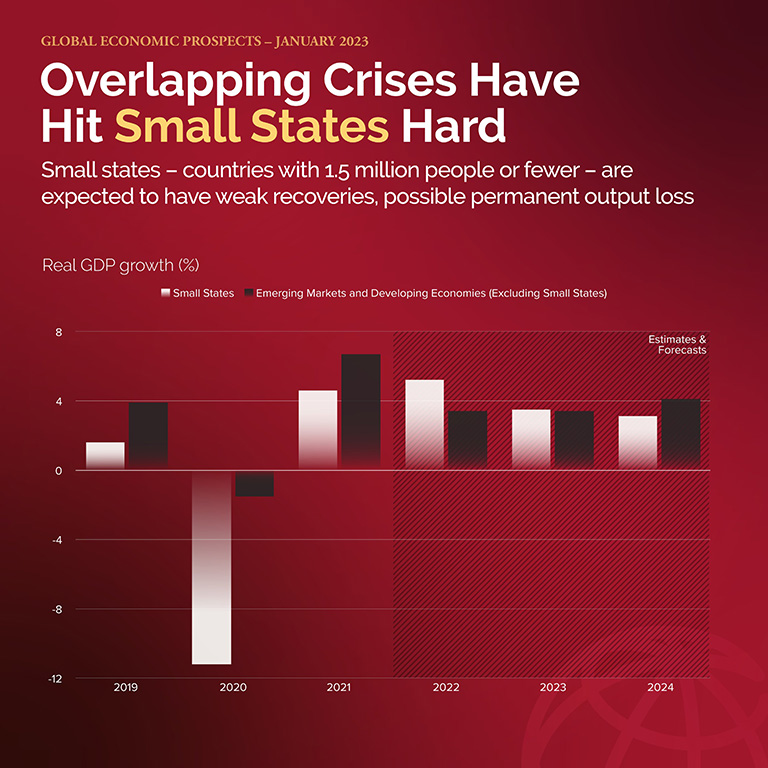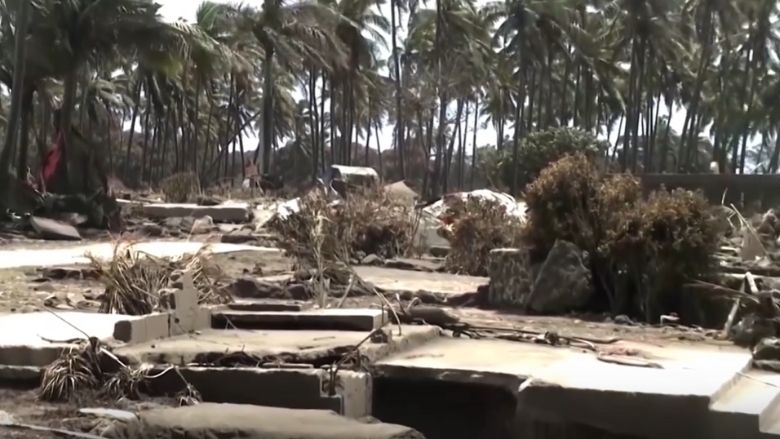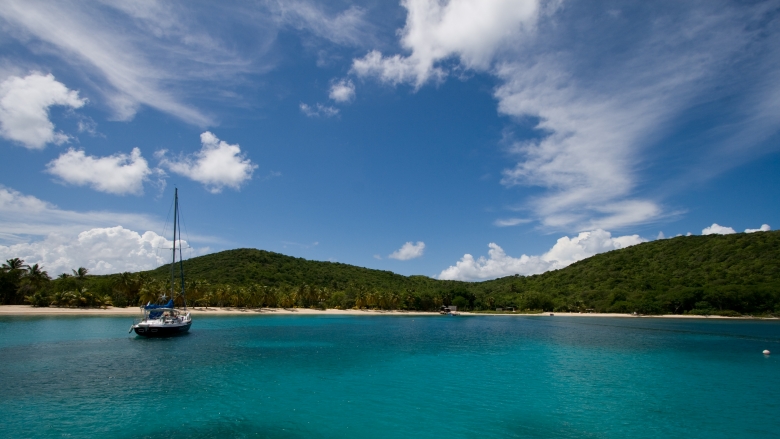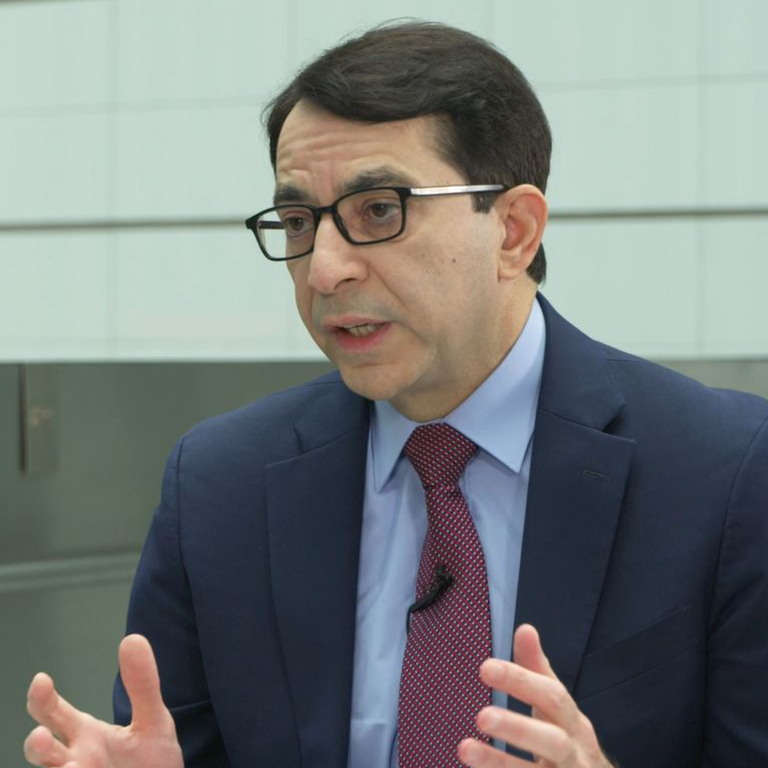The recently released January edition of this year’s Global Economic Prospects report warns that the global economy is dangerously close to a recession, with worldwide economic output projected to be just 1.7% in 2023. While the outlook for all economies is quite grim, the edition takes a special focus on the plight of 37 small states—countries with a population of 1.5 million or less—that are already vulnerable to shocks stemming from the pandemic, climate change, disruptions to tourism and more.
In this episode of The Development Podcast, we speak with three guests: Dana Vorisek, senior economist and one of the lead report authors of the Global Economic Prospects report; the Hon. Tiofilusi Tiueti, Minister for Finance and Tonga World Bank Governor; and Anna Kay, a female-owned restauranteur in Jamaica, who share their insights and experiences to the impacts of a worsening global economy on already vulnerable states.
Tell us what you think of our podcast here >>>. We would love to hear from you!
Featured Voices
- Dana Vorisek, Senior Economist, World Bank Group.
- Hon. Tiofilusi Tiueti, Minister for Finance and Tonga World Bank Governor.
- Anna Kay, a female-owned restauranteur in Jamaica.
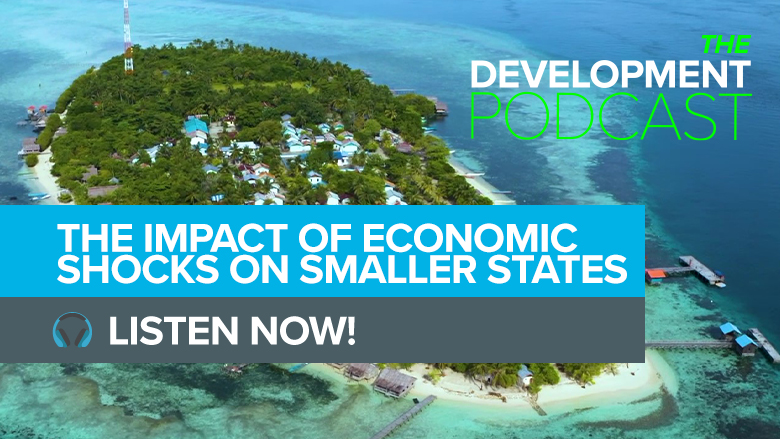
Transcript
[00:00] Raka Banerjee: Hello, and welcome to The Development Podcast from the World Bank Group. I'm Raka Banerjee.
Srimathi Sridhar: And I'm Srimathi Sridhar. Coming up, why are small states facing such low economic growth?
Raka Banerjee: The latest World Bank Global Economic Prospects Report highlighted the big challenges facing small countries, and their slow recovery from the pandemic. We hear from one of the report authors.
Dana Vorisek: The main reason these countries were really, really hard hit by COVID was tourism.
Srimathi Sridhar: We'll also be getting a snapshot of life in Jamaica as tourists return, but supply chains remain a struggle.
Anna Kay: It is really ridiculous. I mean, one of my biggest sellers is oxtail. We're now paying almost two, two-and-a-half times more for it now. It's hard for you as a restaurateur because you can't just get up and change your prices.
Raka Banerjee: And hearing from the Kingdom of Tonga in the South Pacific about climate change, natural disasters and more.
Tiofilusi Tiueti: Eruption of a tsunami and ash fall two years into border closes. The economy and the country was already heavily impacted, especially from prolong disruptions to tourism.
[01:29] Srimathi Sridhar: That's all coming up in this episode. But first, let's delve into some detail. Raka, you just mentioned the Global Economic Prospects published recently. So for anyone who hasn't had time to read this report, what does it spell out?
Raka Banerjee: Well, I hate to say it, but everything is looking pretty gloomy right now. Apparently global growth is now expected to be at its third weakest point in the last three decades. That's, of course, the 2009 and 2020 global recessions were worse, but this is the worst after all of that. The slowdown is expected to be both sharp and long-lasting, and the bank has even revised down its previous projections. So six months ago, it was thinking we would have a 3% global growth rate for 2023. Now, it's looking at 1.7%.
Srimathi Sridhar: Wow. That really doesn't sound good.
Raka Banerjee: Yeah. And there's more. Unfortunately, the negative trends are pretty much holding true across the board. So the report, Global Economic Prospects, it focuses on the challenges faced by a category of economies, which we're dealing with a particularly deep recession in 2020, which we are calling small states.
Srimathi Sridhar: So I think you know what my next question is? What are those exactly?
Raka Banerjee: Small states fall within the overall category of emerging markets and developing economies. We call those EMDEs for short because it's kind of a mouthful. EMDEs is basically just a catchall term for everything that's not considered an advanced economy, and that's according to income level, right? And then small states in particular are defined as those that have populations of 1.5 million people or less. During the pandemic, outputs for small states declined by about seven times as much as for other EMDEs.
Srimathi Sridhar: Wow. I mean, could you share a little bit about why small states experience such a large decline, relatively speaking?
Raka Banerjee: One thing is that small states tend to be particularly vulnerable to shocks, and then we've also been seeing higher prices lately for energy and food. So small states tend to largely import both energy and food, so that's been another hit. And then it's also gotten a lot harder to borrow recently, right? There's both lower external demand and there's higher costs for borrowing right now, and that's particularly tough for small states, especially those that are already pretty significantly indebted.
Srimathi Sridhar: Well, this does paint a pretty bleak picture, but we need it. Thanks for sharing that with us, Raka.
[03:51] Raka Banerjee: Yeah, absolutely. My pleasure. Think of the Caribbean and what springs to mind? White sands, swaying palm trees, holiday heaven. These are the ideals which have attracted so many tourists to the area, but this highly tourism dependent cluster of small states is extremely vulnerable to natural disasters, climate change, and supply change disruption. Jamaica is the largest English-speaking island in the area, a tourist hotspot, and it has a bigger population than its neighbors. In many ways, it's a success story.
Srimathi Sridhar: Jamaica's population of over 2.8 million people means that while it's not technically a small state, it does share many of the same attributes and challenges.
Raka Banerjee: It's not all smooth sailing. COVID dealt many blows there as well.
Srimathi Sridhar: How are businesses on the island bouncing back from COVID? And how are they coping with inflation and cost of living issues?
Raka Banerjee: Our producer, Sarah Treanor spoke to one restaurateur to find out
Sarah Jane Treanor: The sounds of Jamaica on a Sunday afternoon. Let's go on a little walking tour.
Anna Kay: I'm in the center of the town. In Jamaica, I don't know if you know. So everywhere, you have a church, right beside it, you have a bar. It is really interesting and something else. So there is church on a Sunday right across the road from me. So when you sit down, you can be blessed by the sounds of the church on a Sunday. Hi, I'm Anna-Kay Tomlinson. I own a authentic Jamaican restaurant with a little gourmet flair, and I've had that restaurant for 14 years in the town of Ocho Rios. Miss T's Kitchen is located in the heart. When I tell you in the heart, it's literally across from the market. So we're really in the center of things where, I mean, the hustle and bustle is something else.
Sarah Jane Treanor: So who are Anna-Kay customers?
Anna Kay: We get cruise ships, sometimes we get two cruise ships a day, and we get them about between three and four times a week. And then we have the hotels and we have guest houses. And yes, so it's a bubbling little town.
Sarah Jane Treanor: I asked her to explain what life was like when COVID hit.
Anna Kay: Yes. It really was very different. Obviously, we had no cruise ships. A lot of restaurants were closed. Yeah. It became like a ghost town.
Sarah Jane Treanor: And what about since travel rules have relaxed?
Anna Kay: Business has been really, really good, even better than before.
Sarah Jane Treanor: But for Anna-Kay like so many others around the world, supply chain issues are taking their toll.
Anna Kay: We can't get a lot of the things that we used to get, brands that we used to get before, or supplies that we used to get. The biggest thing is the cost of things. And I mean, it is really ridiculous. I mean, one of my biggest sellers is oxtail. We're now paying almost two, two-and-a-half times more for it now. It's hard for you as a restaurateur because you can't just get up and change your prices. Jamaicans, we live on chicken. I mean, we eat chicken like it's going out of style. And it was really ridiculous because chicken was... Every week, they call me, oh, 5% is going on. I mean, it sounds like not much, but when you're running a restaurant and your margins are small and things are tight, and you can't put that to the customer every week and say, listen, prices are going up. But I think what was happening was just the availability of goods like corn to feed the chickens, so all those prices have gone up. Energy, gas, everything. Our electric bills have gone up, water bills have gone up.
Sarah Jane Treanor: And what about retaining staff? A common problem for many in the industry. Anna-Kay says that while she has a full workforce, many others are telling a different story.
Anna Kay: All the good people have left. I was talking to a friend in the hotel industry and he has had people working with them for 20, 25, 30 years. And the other day, they lost almost 30%, 40% of their team because of this. I have a relentless passion for what I do. I absolutely love it. People think I'm crazy because restaurant business is not easy. We're fighting. It's been a fight. It's just the price of goods. Availability was one thing, but then when you can get them, the prices have just been going up and up and up and it just hasn't stopped. So that has been one of the biggest challenges.
Srimathi Sridhar: Well, thanks to Sarah and to Anna-Kay for giving us a tour of her restaurant in Jamaica.
[08:18] Raka Banerjee: From Jamaica to the kingdom of Tonga. Tonga is a tiny country with a population of just over 100,000. It's mainly low lying islands are scattered over hundreds of miles of the South Pacific Ocean. And it's hard to imagine a more vulnerable place when it comes to natural disasters and the impact of climate change.
Srimathi Sridhar: In December 2021, an eruption began on Hunga Tonga-Hunga Ha'apai. By the 15th of January, this mainly underwater volcano to the north of the country's capital, Nuku'alofa on its main island, Tongatapu, had created 300-foot waves with ash shooting into the sky.
Assorted speakers (Footage audio): Everybody get up. Let's go. Just get up.
Assorted speakers (Footage audio): When the first deceptively small waves arrived at Tonga's shores, people had minutes to flee to higher ground before the tsunami hit.
Assorted speakers (Footage audio): At sea level, the eruption resembled a mushroom cloud, a mass of steam, ash, and rock.
Raka Banerjee: The impact for Tongans and for the country's economy was severe, and it came right off the back of a prolonged border shutdown due to COVID as the Tongan Minister for Finance and toga World Bank Governor, the Honorable Tiofilusi Tiueti explains.
Tiofilusi Tiueti: Yeah, thank you. The Hunga Tonga-Hunga Ha'apai volcanic eruption as you both know was a very tragic event in Tonga. 1/1000 years event, which was quite an experience for all the people here in Tonga. The eruption, the tsunami and ash fall occurred two years into border closes due to the COVID-19 pandemic. The economy in the country was already heavily impacted, especially from prolong disruptions to tourism. The country and economy also had not fully recovered from the tropical Cyclone Harold, in 2020 and tropical Cyclone Gita in 2018. Both were a category five cyclone. The volcanic eruption, tsunami, and the ashfall unfortunately claimed four lives. It's a miracle that they weren't more casualties in Tonga. Had the eruption occurred at night, that might have been a different story to tell. Approximately 85,000 people affected, which is 84% of Tongan population. 1,525 people from 317 households have been displaced in Tongatapu and Ha'apai Island.
The economy contracted further to 2.5% in financial year 2022. The immediate aftermath of the eruption and tsunami. And once some international communication was established, the international community responded very quickly, for which we are very, very grateful. The first humanitarian aircraft landed five days after the eruption. Once we were able to sweep and clear the runway. Development partners, including the World Bank, responded swiftly with an immediate US$8 million in emergency funding to Tonga to ensure adequate resources to reestablish basic services and help Tongan families most affected. Before the end of the fiscal year, the World Bank was able to respond robustly with an additional US$35 million as part of the response package.
Raka Banerjee: The minister shared a little more detail about some of the challenges facing Tonga.
Tiofilusi Tiueti: Yeah. The impact of climate change is obviously reflected on the frequency and intensity of the natural disaster, which further impacted our primary sector for economic development. For example, the agriculture and fisheries. It is critical for the survival of the small island states to be able to access additional resources and for development partners to continue to maintain and increase their contributions to overseas development assistance, including IDA. There should be a differentiated approach for ease of access to climate finance facility, such as Green Climate Fund, Adaptation Fund, et cetera, for the small island states. As raised in the COP27, loss and damage finance is very crucial to small island development states.
Srimathi Sridhar: The minister also had this to add.
Tiofilusi Tiueti: Driven by high global commodity prices, inflation increased sharply to 12.9% year-to-year in October 2022. Significantly higher than the National Reserve Bank of Tonga, referenced a rate of 5%. The inflation has really affected Tonga, particularly in its reconstruction. The price of construction materials and labor have increased significantly. Supply chain disruptions causing delays in the shipping and arrival of imports and materials, impacting the pace and the extent possible under the recovery program.
Raka Banerjee: The minister went on to strike a more hopeful note for the kingdom of Tonga.
Tiofilusi Tiueti: We are projecting a bit of growth for this financial year, driven mainly by the reconstruction following the tsunami. However, this will be constrained by the rising inflation.
[13:56] Srimathi Sridhar: Many thanks to the Honorable Tiofilusi Tiueti. We've heard from two different regions where small states have struggled. But let's get a bit more context from Dana Vorisek. She's one of the lead authors of this year's January 2023 edition of the World Bank's Global Economic Prospects report. And she's a senior economist within the Equitable Growth, Finance and Institutions' global practice for the World Bank.
Raka Banerjee: We asked Dana to explain a few of the characteristics of small states.
Dana Vorisek: They are heterogeneous in various ways, but they do tend to have some commonalities. One is that they are very economically open, so that is open to trade. They also tend to be quite economically concentrated. So by that, I mean that most of their production happens in one, two, three sectors, right? They're not diversified. They also tend to have limited government capacity. And this is for a variety of reasons, that they carry over from weak education and also migration, outward migration from these countries. So these are some of the things these countries are facing.
Srimathi Sridhar: So how did COVID make existing vulnerabilities worse? Dana explains.
Dana Vorisek: The main reason these countries were really, really hard hit by COVID was tourism. And what we saw during 2020 and even well into 2021, there were effectively no tourists coming. People were fearful of traveling, but also these countries shut their borders for a long time and even longer than most other emerging market and developing economies, because they didn't have the capacity within their health systems to deal with very large outbreaks of COVID.
Raka Banerjee: And we've also been hearing a lot about issues with supply chain and of course, rising inflation, debt. Can you speak a little bit to those and the impact that they've been having for small states?
Dana Vorisek: So one of the key ways the supply chain disruptions manifested for small states was through shipping costs, right? It's not something we are necessarily talking about so much right now, but these countries are highly reliant on trade, right? So they are importing most of their goods and exporting mostly services. But what they're importing is everything they need, every product they need. And they are super reliant, much more so than other countries on food and fuel imports, right? So what happened during 2020 was that during all these supply chain disruptions, these countries started to face much higher shipping costs. So they were paying more to import everything already in 2021, and then early 2022 came, right? So just almost sort of on the cusp of Russia's invasion of Ukraine, the increase in shipping costs began to flatline a bit. So it was no longer increasing at a rapid pace, but then the invasion of Ukraine happened and food and fuel prices rapidly increased again.
Srimathi Sridhar: How did the pandemic combine with some of these existing vulnerabilities to really hamper recovery for small states?
Dana Vorisek: So one of the major long-term challenges and risks that small states face is related to natural disasters and climate change. And if you look backward over time, over a 30-year period from 1990 to 2021, these countries on average have experienced damages and losses of about 5% of GDP annually, right?
Srimathi Sridhar: Wow.
Dana Vorisek: That is immense. It's about 15 times higher than what other emerging market and developing economies have experienced. It has repeatedly set these countries back. A big cyclone or hurricane comes or a big flood or a drought even in some countries. And it really has a short-term impact, destruction of infrastructure. But that leads to long-term challenges in competitiveness and advancement in per capita incomes.
Raka Banerjee: Okay. So small states are really struggling with a lot of things right now. Are there any success stories that you can share with us?
Dana Vorisek: One of the examples that comes up often is the experience of Mauritius, right? Mauritius is an island economy in the Indian Ocean, far from lots of things. But over decades it has become... You have been able to see it shift from predominantly agriculturally based economically, it was a sugar producer for a long time, to then getting into manufacturing of clothing, and various other things. And then over time now, it's predominantly services based economy, right? So during that time, it has made a really clear trajectory in per capita income gains and really, really advancing the living standards of people there.
Raka Banerjee: Dana Vorisek, many thanks for joining us on the podcast.
[18:44] Srimathi Sridhar: Well, that's about all we have time for on this episode of The Development Podcast from the World Bank Group. I'm Srimathi Sridhar.
Raka Banerjee: And I'm Raka Banerjee. Thanks for listening and do get in touch with us with comments, suggestions, thoughts. We are at thedevelopmentpodcast@worldbank.org.
Srimathi Sridhar: We'll be back soon. And in our next episode, we'll be taking a look at the impact of the war in Ukraine one year on. Make sure to join us then.
ABOUT THE DEVELOPMENT PODCAST
This international development podcast brings together the data, research—and solutions—that can pave the way to a sustainable future. Through conversations focused on revealing the latest data, the best research, and cutting-edge solutions, let us introduce you to the folks working to make the world a better place. Don't miss an episode! Listen and subscribe for free on your favorite platform. And rate our show! ;)
Tell us what you think of our podcast here >>>. We would love to hear from you!
ABOUT THE WORLD BANK GROUP
The World Bank Group is one of the world’s largest sources of funding and knowledge for low-income countries. Its five institutions share a commitment to reducing poverty, increasing shared prosperity, and promoting sustainable development.
